世界首富 比尔·盖茨的2014年终总结(中英对照版)

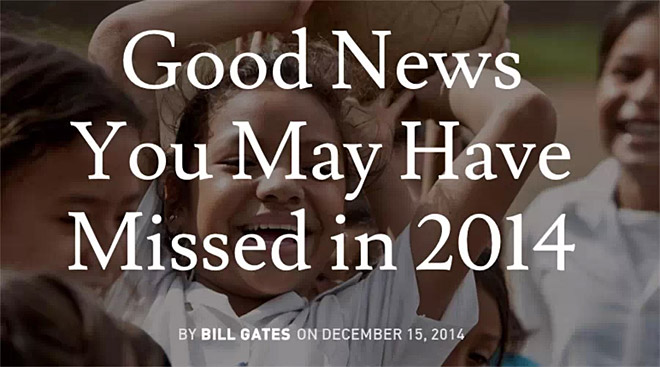
原文作者:比尔·盖茨
文章编译:丁香医生
这是传奇人物比尔·盖茨十天前在其个人网站 gatesnotes.com 上发布的一篇年度总结,
同 2013 年末一样,他用这种方式来做年终总结。
今年,我们有哪些好消息?
__________________________________________________________________________________________
我写了一些略微特别的东西来结束2013年:一份你可能已经错过的好消息的清单。
我想,以那样的方式为这一年划上句号,是一个非常棒的方式,而且人们似乎很愿意看到我们的世界在一天天变得更好。
今年,我还要这么做。不能否认,在美国以及其他国家,2014 年是动荡的一年。但是还有好消息值得我们去庆祝:相比以前,更多的孩子得以存活;面对全世界最致命的疾病,我们在不断进步。
衡量世界是否进步,有几种重要的方法。通过这些方法我们看得到,2014 年又是进步的一年。
Looking Up
I ended 2013 by compiling something slightly unusual: a list of some of the good news you might have missed. I thought it was a pretty good note to end the year on, and people seemed to like reading about some of the ways the world is becoming a better place. This year, I thought I’d do it again.
Of course, we can’t ignore the fact that it’s been a turbulent year, in the United States and many other countries. But it’s worth taking a moment to celebrate some of the good news too. More children are surviving than ever before. We’re making progress against some of the world’s deadliest diseases. These are some of the most fundamental ways to measure the world’s progress—and by that measure, 2014 was definitely another good year.
1. 有更多孩子过上了他们的 5 岁生日
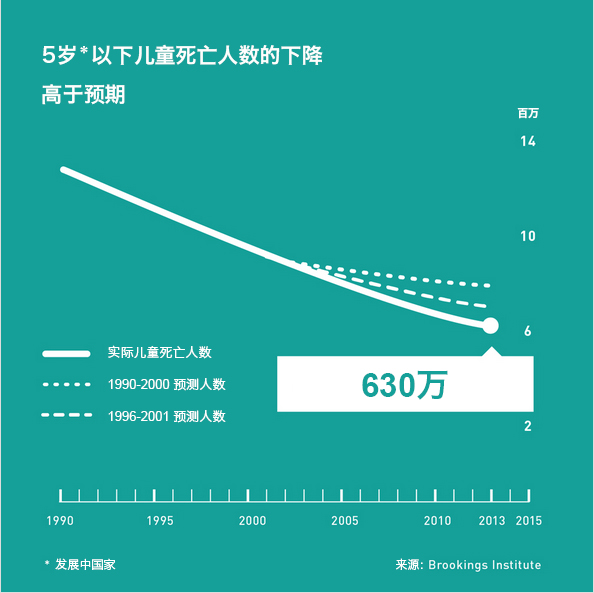
对我来说,判断世界是否进步最好的方式,就是看看有多少孩子的死亡其实可以避免。如今,能活到 5 岁的孩子,比以往任何时代都要多。
到今年为止,已经连续 42 年,儿童的死亡率在不断下降,这个数字不止是在持续下降,下降速度也出人意料地迅速。
《经济学人》杂志今年 9 月发表的一篇文章称:自 2001 年以来,我们已经挽救了 1 360 万孩子的生命。不难想像,这是世界进步的标志。
1、More Fifth Birthdays Than Ever Before
To me, one of the best ways to measure progress is to look at how many children are dying of preventable causes. And today, more kids are living to see their fifth birthday than ever before. This year, for at least the 42nd year in a row, the child mortality rate has fallen. And it’s not just moving in the right direction—it’s falling faster than anyone expected. The Economist ran a great article about this in September, where it estimated that just since 2001, the world has saved 13.6 million children’s lives. It’s hard to think of a better sign the world is improving.
2. 里程碑与艾滋病的斗争

对于 HIV 病毒感染者的治疗,我们已经取得了非常不错的成果。但是前些年,不得不说,我们落在了 HIV 后面:虽然越来越多的 HIV 携带者开始接受治疗,但却总有更多的人感染了 HIV 病毒。
但今非昔比,本月新发布的数据报道显示:2013 年,接受治疗的患者数量首次超过新增感染者。
为什么会这样?
治疗不仅可以让病毒携带者生存下去,还可以大幅度减少病毒传播的可能性。
如流行病学家所说,这是一个转折点。虽然离消灭艾滋病还有一段很长的路要走。但是,这是里程碑式的一年。
2、We Hit a Big Milestone in Fighting AIDS
The world has done an impressive job of providing treatment to people living with HIV. But for years we were falling behind, because for all the people who started getting treatment, even more would become infected. Not anymore, though. New data released this month show that 2013 was the first year when more people started getting treatment than became infected with HIV. Why does that matter? Because treating people not only keeps them alive, it also dramatically reduces the odds that they will pass the virus on to anyone else. As the epidemiologists say, we can start to bend the curve of the disease. We still have a long way to go before we can declare the end of AIDS, but this is a big milestone.
3. 有更多孩子注射了轮状病毒疫苗
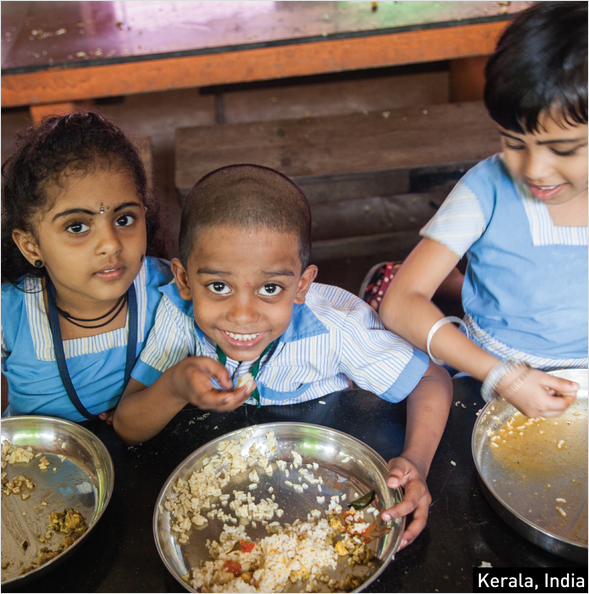
上世纪 90 年代末,我读到一篇文章,每年有数十万儿童死于轮状病毒引起的腹泻。我不敢相信,竟有如此可怕的疾病,可以带走那么多孩子的生命,而我对此疾病却一无所知。但是对于轮状病毒的报道并不多,因为在发达国家,这并不是致命的疾病,而这个世界总是忽略只有穷人才会得的疾病。
从许多方面讲,轮状病毒是我投身于全球健康事业的催化剂。事实上,这是我们基金会最早投入的项目之一。
从那以后,由于研发出了既便宜又有效的疫苗,丧生于轮状病毒的孩子数量已经减少了将近一半。今天,这种疫苗已经惠及到更多的孩子。比如在印度,轮状病毒每年夺走 8 万个孩子的生命。今年印度政府决定免费给孩子们接种这种疫苗。
同时,药厂也在努力做出更便宜的疫苗,为的是让更多家庭负担得起接种疫苗的费用。
3、Rotavirus Vaccine is Reaching More Kids Than Ever
When I read an article in the late 1990s that mentioned a diarrheal disease called rotavirus killed hundreds of thousands of kids a year, I couldn’t believe something I’d never even heard of was killing that many children. But rotavirus doesn’t get much press because it’s almost never deadly in rich countries—and the world tends to ignore diseases that only affect the world’s poorest people. In many ways, rotavirus was a catalyst for my commitment to global health—in fact, one of our foundation’s first grants supported efforts against rotavirus. Since then, the number of kids dying from this illness has been cut nearly in half thanks to a cheap and effective vaccine. And today, that vaccine is reaching more kids than ever before. For example in India, where rota kills nearly 80,000 children a year, the government decided this year to deliver the vaccine for free to poor children. And manufacturers there are working on a more affordable vaccine that could reach even more children in the coming years.
4. 结核病治疗终于有所突破
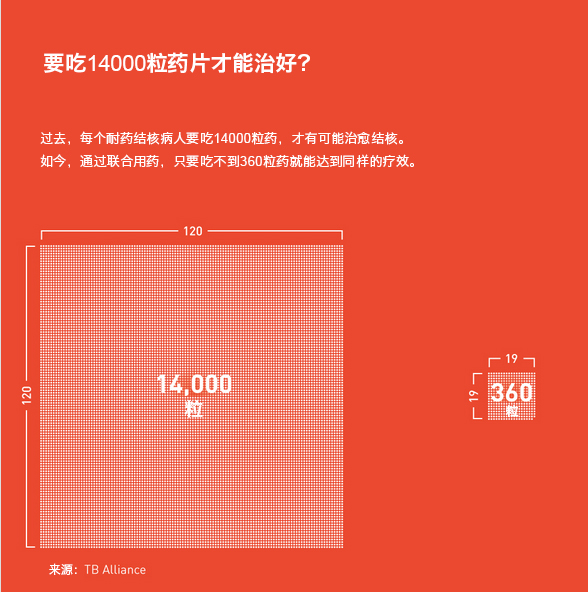
对于结核治疗的研究,我们一直很落后。
结核一直是导致人类死亡的重大原因,遗憾的是,目前的治疗方案并不完善——尤其是耐药性结核。近几十年来,一直停滞不前。
因此,今年上半年,一种治疗结核病的新方案在前期试验中已取得良好效果,这个消息,很是让人兴奋。
现在,这个方案已经进入大型临床试验阶段。如果新的治疗方案可以得以推广,耐药性结核病的治疗时间将大大缩短,并且可以节省贫穷地区数十亿的医疗保健支出。
4、A Tuberculosis Breakthrough—Finally
The world is way overdue for a better tuberculosis treatment. TB is one of the world’s leading causes of death, and our existing treatments are inadequate—especially for drug resistant forms of the disease. But efforts to improve them have been stalled for decades. So it’s a big deal that earlier this year, scientists announced that a new TB treatment regimen has proven effective in early-phase research. From here, the drug regimen goes on to a large clinical trial to confirm the results. If this new treatment regimen pans out, it could dramatically reduce the time it takes to cure drug-resistant TB and save poor countries billions of dollars in health-care costs.
5. 对抗小儿麻痹的经验让尼日利亚驱逐埃博拉病毒
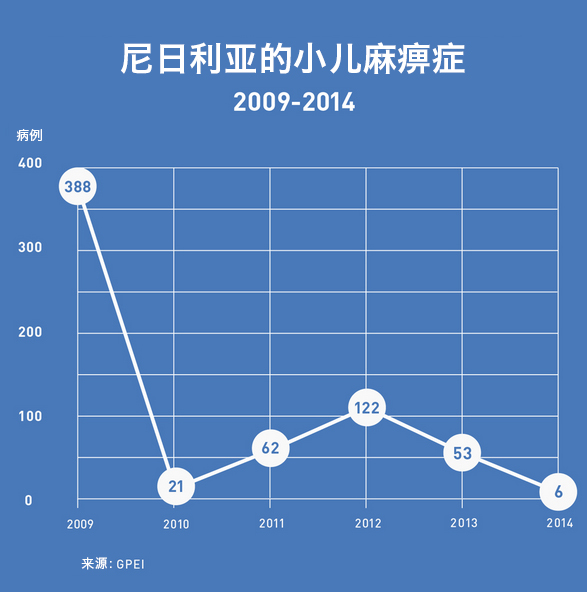
今年,新闻媒体对于尼日利亚铺天盖地报道,焦点主要集中在两件事上:埃博拉和恐怖袭击。
两件可怕的事却掩盖了这样一个事实:从全球健康角度来看,尼日利亚的 2014 年其实是一个好年头。
世界上有三个国家还没有消灭小儿麻痹症:尼日利亚、巴基斯坦和阿富汗,但是我认为,尼日利亚即将从该名单上消失。
尼日利亚今年报道的小儿麻痹症病例只有 6 例,而去年有 50 多例。更难能可贵的是,为了对抗小儿麻痹症,尼日利亚已经完成了很多基础设施,这让他们更快、更容易地控制埃博拉病毒。
事实上,尼日利亚成功驱除埃博拉病毒的案例正是其他国家处理这种突发疾病的绝好范例。
5、Nigeria’s Fight Against Polio Helped Its Fight Against Ebola
A lot of the media coverage about Nigeria this year focused on two things: Ebola and terrorism. Both are frightening, and they masked the fact that from a global health perspective, Nigeria actually had a pretty good year. Although it’s one of only three countries that have never been free from polio (Pakistan and Afghanistan are the other two), I don’t think it will be on that list for long. Nigeria has reported only six cases of polio this year, compared to more than 50 last year. What’s more, the infrastructure Nigeria has built to fight polio actually made it easier for them to swiftly contain Ebola. The fact that Nigeria is now Ebola free is a great example of how doing the work to fight things like fighting polio also leaves countries better prepared to deal with outbreaks of other diseases.
6. 展望我们的美好未来
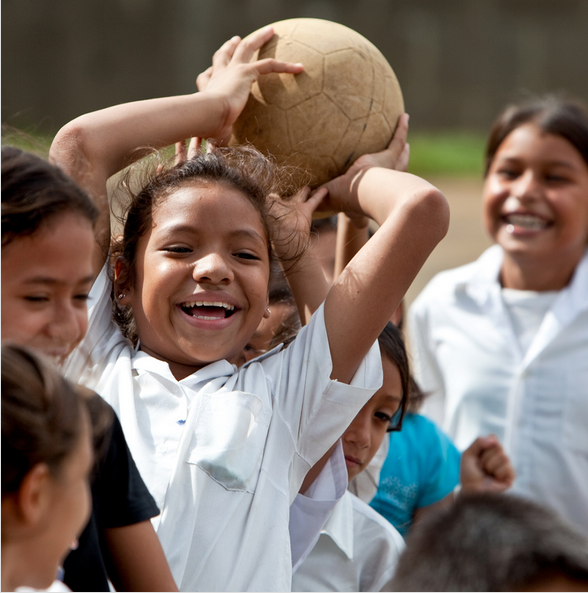
再提一件事:一月份,Melinda 和我将发表下一封年度信(annual letter)。这一次,我们把目光投向 2030 年。我们将涉足好几个领域,从健康到农业再到银行业,尤其是在特别贫穷的地区,在这些领域将发生真正的剧变。
6、Looking Ahead
One more thing: this January, Melinda and I will publish our annual letter. This year, we’re looking ahead to 2030. We’ll be writing about a few areas—from health to farming and banking—where life will really change, especially for people in some of the world’s poorest places. (Spoiler alert: we think there’s a lot more progress ahead.) If you’d like to get an e-mail notice when the letter is out, you can sign up below.
转载请在文章开头和结尾显眼处标注:作者、出处和链接。不按规范转载侵权必究。
未经授权严禁转载,授权事宜请联系作者本人,侵权必究。
本文禁止转载,侵权必究。
授权事宜请至数英微信公众号(ID: digitaling) 后台授权,侵权必究。












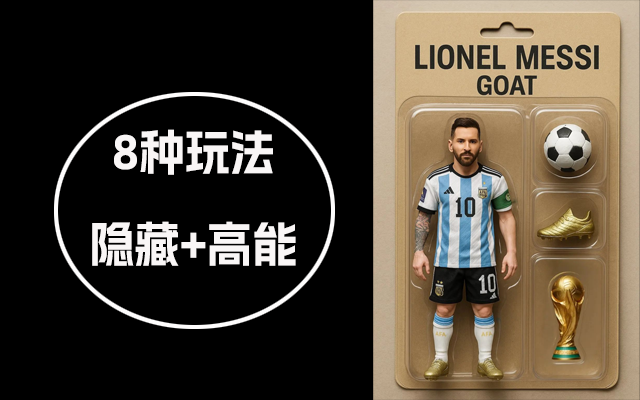
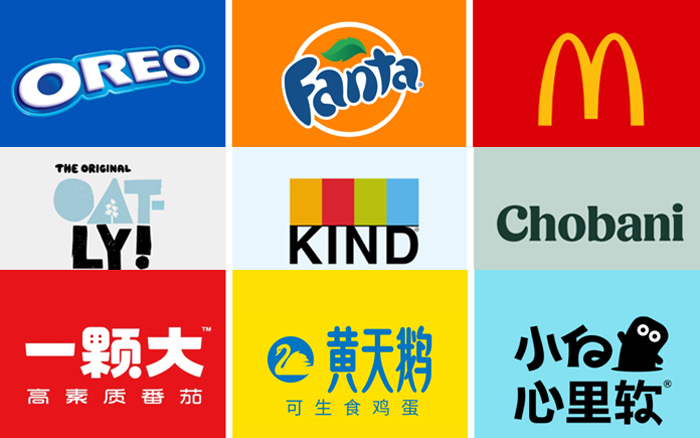









评论
评论
推荐评论
全部评论(11条)